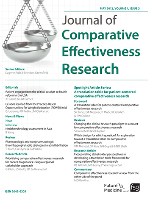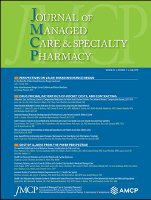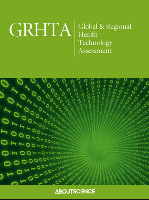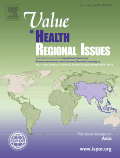
European Journal of Health Economics
Scope & Guideline
Empowering Research in Health Economics and Policy
Introduction
Aims and Scopes
- Health Economic Evaluations:
The journal publishes studies that assess the cost-effectiveness and economic impact of health interventions, treatments, and technologies. This includes cost-utility analyses, budget impact analyses, and systematic reviews of economic evaluations. - Measurement and Valuation of Health Outcomes:
Research on health-related quality of life (HRQoL) measurement tools such as the EQ-5D, SF-6D, and other preference-based instruments is a core focus. The journal explores methodologies for valuing health states and the implications for health technology assessments. - Health Policy and Economics:
The journal examines the intersection of health policy and economics, analyzing the impacts of regulations, reimbursement strategies, and health care financing on health outcomes and efficiency. - Social Determinants of Health:
There is a growing emphasis on understanding how socioeconomic factors, demographics, and social determinants influence health care utilization, costs, and health outcomes. - Methodological Innovations in Health Economics:
The journal encourages innovative methodologies in health economics, including the use of machine learning, econometric modeling, and advanced statistical techniques to inform health care decision-making. - Global Health Economics:
Research addressing international health economics issues, including cross-country comparisons, health system performance, and the economic impact of global health challenges like pandemics, is increasingly featured.
Trending and Emerging
- Impact of COVID-19 on Health Economics:
Research examining the economic implications of the COVID-19 pandemic is trending, focusing on health system resilience, the economic burden of the pandemic, and policy responses to health crises. - Digital Health and Telemedicine:
There is a growing emphasis on the economic evaluation of digital health interventions and telemedicine, highlighting their role in improving access to care and reducing costs. - Integration of Mental Health Economics:
The journal is increasingly featuring studies that evaluate the economic aspects of mental health interventions, recognizing the significant burden of mental health disorders on health systems. - Health Equity and Economic Disparities:
Research exploring health inequalities and the economic impact of social determinants of health is gaining traction, reflecting a broader societal focus on equity in health care. - Patient-Centered Outcomes and Preferences:
Emerging studies are focusing on patient-reported outcomes and preferences, emphasizing the importance of incorporating patient perspectives into economic evaluations. - Value-Based Health Care Models:
There is a trend towards evaluating value-based health care models, assessing how these frameworks can improve health outcomes while managing costs effectively.
Declining or Waning
- Traditional Cost-Benefit Analyses:
There appears to be a decline in studies focusing solely on traditional cost-benefit analyses without integrating broader economic impacts or quality of life considerations, as the field moves towards more comprehensive evaluations. - General Health Care Utilization Studies:
Research that solely examines health care utilization without a strong economic analysis or cost-effectiveness perspective seems to be less frequent, shifting towards studies that link utilization with economic outcomes. - Focus on Specific Diseases:
There is a noticeable reduction in publications concentrating exclusively on specific diseases (e.g., diabetes, hypertension) in favor of broader health system analyses or cross-disease evaluations. - Descriptive Studies Without Economic Analysis:
The journal is increasingly prioritizing empirical research that includes economic evaluations, leading to a decrease in purely descriptive studies that do not incorporate cost analyses.
Similar Journals

American Economic Journal-Applied Economics
Connecting Theory to Practice in the Economic LandscapeWelcome to the American Economic Journal - Applied Economics, a premier publication in the field of applied economics that strives to provide scholars and practitioners with cutting-edge research and insights. Published by the American Economic Association, this journal ranks in the top quartile (Q1) of Economics, Econometrics, and Finance categories as of 2023, reflecting its significant impact and relevance in the field. With a notable Scopus ranking of #5 out of 288 in General Economics and a distinguished percentile of 98th, this journal serves as a vital resource for advancing knowledge in economic theory and its application to real-world issues. Although not open access, it remains accessible to a broad audience, and welcomes submissions that explore innovative methodologies and empirical analyses that bridge theory and practice. Spanning from 2009 to 2024, the journal not only supports rigorous academic discourse but also plays a crucial role in shaping the discourse around effective economic policy. We invite researchers, professionals, and students in the field to engage with the high-quality work published within these pages.

Journal of Comparative Effectiveness Research
Enhancing clinical effectiveness with global perspectives.Journal of Comparative Effectiveness Research is a leading academic journal dedicated to the evaluation of healthcare interventions and practices, published by Becaris Publishing. Since transitioning to a fully Open Access model in 2023, the journal has expanded its accessibility to a global audience of researchers, healthcare professionals, and policy makers. With a focus on comparative effectiveness in health policy, it has achieved a notable ranking of #132 out of 310 in the Scopus category for Medicine and Health Policy, placing it in the 57th percentile for scholarly impact. Operating from the United Kingdom, the journal encompasses research from 2012 to 2024 and firmly establishes itself in the academic landscape as a Q2 journal in the Health Policy category as of 2023. By disseminating high-quality, evidence-based research, the Journal of Comparative Effectiveness Research plays a vital role in informing clinical practice and health policy decision-making, making it an essential resource for those dedicated to improving health outcomes.

Journal of Managed Care & Specialty Pharmacy
Connecting Research and Practice for Enhanced Patient CareThe Journal of Managed Care & Specialty Pharmacy is a premier publication in the realm of health policy and pharmaceutical science, dedicated to enhancing the understanding and practices surrounding managed care systems and specialty medications. Published by ACAD MANAGED CARE PHARMACY, this journal boasts an impressive Q1 ranking in both Pharmaceutical Science and Pharmacy, underscoring its significance in advancing professional discourse and research in these critical areas. With a focus on innovative care strategies and patient-centered approaches, it aims to share impactful research, reviews, and opinions that shape the future of health policy and pharmaceutical practices. The journal is available in an open access format, ensuring that vital information is universally accessible to researchers, practitioners, and policymakers alike. With its inception in 2014 and an ongoing commitment to excellence through 2024, the journal is firmly established as a leading resource within its field, making it essential reading for professionals dedicated to improving managed care and specialty pharmacy solutions.

Applied Health Economics and Health Policy
Shaping health policy with evidence-based economic insights.Applied Health Economics and Health Policy, published by Springer International Publishing AG, stands as a premier academic journal dedicated to the intersection of economic theory and health policy. With a strong focus on the practical application of economic principles to health issues, this journal addresses crucial topics such as healthcare financing, resource allocation, and economic evaluation of health interventions. Its impressive rankings—in the top quartile for both Health Policy and Medicine, as well as a notable second quartile in Economics—illustrate its significant impact within the fields of health economics and policy research. The journal is aimed at researchers, policymakers, and students who seek to explore innovative solutions to contemporary health challenges. Established in 2002 with ongoing publications through 2024, the journal features open access options that enhance accessibility and engagement with its extensive body of research articles, ensuring that vital insights are available to a global audience.

ClinicoEconomics and Outcomes Research
Connecting Theory and Practice in Health EconomicsClinicoEconomics and Outcomes Research is a prestigious open-access journal published by DOVE MEDICAL PRESS LTD, located in New Zealand. Since its inception in 2009, it has established itself as a vital resource for researchers and practitioners in the fields of economics, health policy, and outcomes research. With a commendable impact reflected in its rankings—Q1 in Economics, Econometrics and Finance and Q2 in Health Policy—the journal effectively bridges the gap between economic evaluation and healthcare delivery. This publication is particularly significant for those focused on the economic implications of health interventions, policy analysis, and decision-making processes in healthcare systems. As an open-access journal, ClinicoEconomics and Outcomes Research ensures that its valuable content is widely accessible, enhancing knowledge dissemination and fostering collaboration among academia, industry, and policymakers. With an ambition to contribute to the improvement of health outcomes through rigorous research, it invites submissions that address the multifaceted challenges facing the economics of healthcare today. Join the scholarly dialogue where innovative ideas in health economics thrive!

Global & Regional Health Technology Assessment
Empowering global health decisions with research.Global & Regional Health Technology Assessment (ISSN: 2284-2403; E-ISSN: 2283-5733) is an esteemed open-access journal published by ABOUTSCIENCE SRL, dedicated to the dissemination of research in the field of health technology assessment on a global and regional scale. Since its inception in 2014, this journal has focused on the critical evaluation of health technologies, providing invaluable insights into their efficacy, cost-effectiveness, and impact on healthcare systems. With an increasing emphasis on public health and policy implications, the journal encourages interdisciplinary research that bridges gaps between technological innovations and health outcomes. Despite its relatively recent establishment, it has made significant inroads with Scopus rankings reflecting the growing importance of health technology assessment in global health discourse. The journal welcomes contributions from researchers, professionals, and students, inviting them to engage in discussions that shape the future of health technology, with the aim of informing stakeholders and policymakers worldwide.

AMERICAN JOURNAL OF MANAGED CARE
Shaping the future of managed care through research.AMERICAN JOURNAL OF MANAGED CARE is a premier peer-reviewed journal dedicated to the dissemination of research and insights in the fields of health policy and managed care. Published by Managed Care & Healthcare Communications LLC, this esteemed journal has been instrumental in shaping discussions on healthcare management and policy since its inception in 1996. With a 2023 classification in the first quartile (Q1) for both Health Policy and Medicine (miscellaneous), it stands as a significant resource for researchers, professionals, and students seeking to stay at the forefront of healthcare advancements. While this journal does not offer open access, it provides essential content that influences policy formulation and clinical practices across the United States and beyond. With a robust impact factor and a strategic focus on evidence-based methodologies, the AMERICAN JOURNAL OF MANAGED CARE remains committed to fostering a deeper understanding of managed care systems and improving healthcare delivery.

Health Policy OPEN
Transforming health policy insights into actionable solutions.Health Policy OPEN is an esteemed open-access journal published by Elsevier that has made significant contributions to the field of health policy since its inception in 2020. With an impact factor placing it in the prestigious Q2 category of health policy journals, it ranks 116 out of 310 within the Scopus database, highlighting its critical engagement in the field and situating it within the 62nd percentile. As an open-access platform, Health Policy OPEN promotes the dissemination of high-quality research, making it accessible to a global audience of researchers, professionals, and students alike. The journal focuses on topical issues, innovative approaches, and evidence-based practices that shape health policies worldwide. With its headquarters in Amsterdam, Netherlands, the journal serves as a vital resource for advancing knowledge and fostering discussions that drive health policy initiatives and reforms. Engage with Health Policy OPEN to contribute to the evolving landscape of health policy and to stay informed on the latest research advancements.

HEALTH POLICY
Exploring innovative solutions for health equity.HEALTH POLICY is a leading academic journal dedicated to the examination and analysis of health policy issues globally, published by Elsevier Ireland Ltd. With an impressive Q1 classification in the field of Health Policy, as indicated by its Scopus ranking of #44 out of 310 and an 85th percentile standing, this journal serves as a critical platform for researchers, practitioners, and policymakers interested in the complexities of health systems and the impact of policy decisions. Since its inception in 1984 and continuing through 2024, HEALTH POLICY has consistently contributed to the discourse surrounding health services, equity, and sustainability, providing access to original research, thorough reviews, and insightful commentaries. Although it operates under a traditional subscription model, the journal is essential for those seeking to stay informed on contemporary challenges and emerging trends in health policy.

Value in Health Regional Issues
Exploring the Economics of Health, One Region at a Time.Value in Health Regional Issues, published by Elsevier, is an essential academic journal that addresses critical developments in the field of health economics, policy, and pharmaceuticals. With an impressive impact factor, this journal has established itself as a leading platform for disseminating innovative research, evidenced by its Q1 quartile ranking in Economics, Econometrics and Finance and Pharmacology, Toxicology and Pharmaceutics. Founded in 2012, the journal is dedicated to exploring value-based healthcare, focusing on regional perspectives that highlight economic implications and health outcomes. Covering a convergence of multidisciplinary themes, the journal fosters academic collaboration and provides researchers, professionals, and students with access to high-quality, peer-reviewed articles. As it continues to expand its scope through 2025, Value in Health Regional Issues remains a pivotal resource for those seeking to understand and influence health policy and economic frameworks on a regional, national, and global scale.